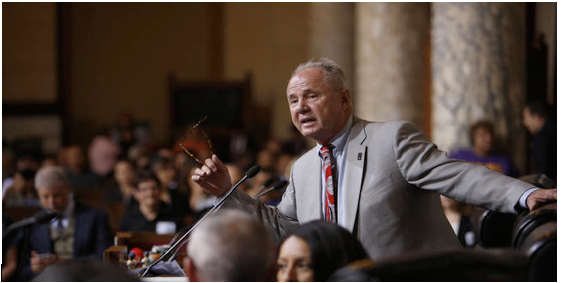CommentsLA WATCHDOG--You need be a skilled forensic accountant with a large, well trained staff to even begin to understand the shenanigans associated with the discretionary slush funds controlled by the fifteen members of the City Council. You may even need a high priced lawyer to haul the Council Members into court to have them honor your request made pursuant to the California Public Records Act.
Of course, we all know that each member of the City Council has a detailed accounting of the status of his or her slush funds that are used to pay for their bloated staffs, fund pet projects, and buy favors in their local communities.
Over the years, the City Council has systematically diverted funds to their less than transparent slush funds, depriving the General Fund of resources that could have been used to fund more worthwhile projects such as maintaining our streets and sidewalks, building affordable housing, or assisting our ever growing homeless population.
Sources of funds for these slush funds include the Street Furniture Fund (advertising revenues from bus shelters), Oil Pipeline Franchise Fees, the Real Property Trust Fund (50% of the sale of surplus property in a Council District), and AB 1290 Funds (tax increment funds associated with the dissolution of the corrupt Community Redevelopment Agency).
There are also several lucrative slush funds that are under the thumb of individual Council Members. Felipe Fuentes controls the Lopez Canyon Community Amenities Trust Fund while Jose Huizar watches over the disbursements of the controversial Central LA Community Recycling & Transfer Station (better known as CLARTS) Communities Amenities Fund.
Unfortunately, the total amount of money flowing in and out of these slush funds is a mystery that the City Council is unwilling to disclose. But it must be considerable as former Mayor Antonio Villaraigosa claimed in 2010 that these “pet project funds” held $40 million, money that he wanted to “borrow” to help close the City’s projected $212 million budget deficit.
While the Council Members use these slush funds for a variety of self-aggrandizing pet projects such as schools, parks, museums, and the zoo, a significant portion of these slush funds are used to pay for the bloated staffs of the City Council.
According the City Budget, there are 108 positions allocated to the City Council. This includes the fifteen members of the City Council. Yet, according to the telephone directories and the web sites of the Council Members, there are over 300 employees on the City Council payroll, an increase of almost 200 bodies. These extra staffers are funded by less than transparent payments from Council’s slush funds.
This sleight of hand is unacceptable, especially since the City is struggling to close a massive budget deficit at the same time it wants to repair our streets and sidewalks, finance affordable housing, and assist the homeless.
As a first step, the City Council should halt the diversion of our money to these less than transparent slush funds. Rather, the cash should be directed to the General Fund and allocated in a manner that benefits all Angelenos.
As it is, the City budgets $100,000 a year to each Council Member’s discretionary slush fund. In addition, each Council Member may raise up to $75,000 from generous benefactors for a discretionary Officeholder account.
The City Council’s budget must also be transparent by including its actual staffing levels in the City’s Budget. This would also include staffers that are paid by other departments such as the three proprietary departments and the Bureau of Sanitation.
The City Council must also provide us with a detailed five year analysis of the activity of these slush funds so that we can have a better understanding of where our money has been spent.
Finally, each Council Member should have real time disclosure of his or her discretionary slush fund and prepare an easy to understand quarterly report on these accounts.
The City Council may tell us to buzz off, take a hike, that it is none of our business how these know-it-alls spend our money. But in the 2015 election to succeed Tom LaBonge, (photo above) the questionable use of discretionary slush funds was a major issue that definitely influenced the outcome of the election, allowing David Ryu to defeat LaBonge’s former Chief of Staff.
The City Council will be asking us to approve tax increases in November of 2016 and March of 2017. But why should we agree to these increases if we do not trust our City Council to use our hard earned money in a transparent manner?
(Jack Humphreville writes LA Watchdog for CityWatch. He is the President of the DWP Advocacy Committee and a member of the Greater Wilshire Neighborhood Council. Humphreville is the publisher of the Recycler Classifieds -- www.recycler.com. He can be reached at: [email protected].)
-cw
